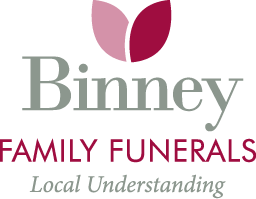Funeral Planning for Peace of Mind
Peace of mind and consideration for your family and friends are two good reasons to plan ahead and meet the costs of funeral expenses. It is both sensible and a responsible way of leaving everything in order so as to not place a financial burden on those that care about you.
The days after a loved one’s death are too often lost forever in a maze of detail that no one ever anticipated. As a result, families have little chance to evaluate their choices. The way to ensure that those left behind are not confronted with decisions that must be made hastily, is to put both the financial and funerals arrangements in place before hand.
Should there be any questions in your mind, Binney Family Funerals will be pleased to answer them for you.
Pre-Arranged Funeral Plan
Binney Family Funerals believe in creating meaningful funerals, individually tailored to you and your family’s needs, therefore the costs of each funeral may vary. Arrangement details according to your personal wishes are recorded on a pre-agreement schedule together with an estimate of costs. You may contribute as much or as little as you wish. Whether you contribute or not your wishes are known to us and become a guide to your family when required.
Should you make any contributions, your monies are placed with Foresters Friendly Society (‘Foresters’). Foresters are regulated by the Australian Prudential Regulation Authority (‘APRA’). Foresters engages competent investment managers to add value while ensuring the safety of your money. This allows Foresters to guarantee your capital and to declare an annual bonus each year as at June 30.
Pre-payment Options
How do you make sure that there is sufficient money available to cover the cost of your funeral, or to help plan the funeral costs for someone else? What options are available?
1. Prepaid funeral plan
A pre-paid funeral plan is a written contract between you and Binney Family Funerals. It details the funeral service of your choice and you pay for it at today’s prices.
When considering a fixed price funeral plan the main points to remember are:
- You choose your preferred funeral director
- You decide on the funeral service that you want
- You receive a written contract documenting your wishes
- You pay for it at today’s prices – you know exactly what your financial commitment is and there is no more to pay
- You answer all the funeral questions now many of which your loved ones may struggle with in the future
- You protect your loved ones from both financial and emotional stress
- Your investment is not deemed an asset so it can help maximize your pension entitlements
- You are not limited in the amount you invest
- Some funeral firms may allow you to pay for your plan by instalments over a three-year period
- Your investment is held at arm’s length from the funeral director
- Should Binney Family Funerals cease to operate for any reason, your investment will be maintained by Foresters in the Funeral Benefit Fund. These funds can only be released by Foresters on your passing
Funeral directors allow people to ‘prepay’ their funeral, with the cost calculated on the features that the person selects, such as the style of coffin and the type of service. These funerals are in ‘today’s dollars’ and can be paid as a lump sum or in instalments.
2. Funeral bonds
Binney Family Funerals offer and promote the Foresters Funeral Bond.
The Foresters Funeral Bond is a capital guaranteed investment. The specific purpose being to contribute towards future funeral expenses.
When considering a funeral bond, the main points to remember are:
- It is a secure investment in your name
- It helps relieve the stress and the financial burden of funeral expenses
- You can invest up to $12,250 (indexed annually)
- The bond grows in value as it enjoys annual bonuses
- Monies invested are not deemed part of your assets nor bonus payments part of your income for pension purposes
- You can invest as little as $25 per month when making regular contributions
- Should you stop making payments at any time then the money is retained in the fund in your name
- Monies invested in a funeral bond must be used to contribute towards the cost of your funeral
- A funeral bond can be taken out in joint names
- You can nominate your preferred funeral director
- Your investment is portable and moves with you should you change your place of residence
- A funeral bond is an effective investment vehicle through which you can financially protect your loved ones
Some investment organisations such as friendly societies and insurance companies offer investment bonds which can be used to save for a funeral. The investor chooses the amount to be invested, either by planning the details of the service, or just by choosing a particular amount. The investor can invest a lump sum, or pay in regular instalments.
The bond can be used to pay for a funeral with any funeral director. Bonds cannot be cashed in.
3. Funeral insurance
Some insurance companies offer insurance policies designed for funeral cover. The insured person pays a regular premium for a benefit amount that they choose. The money goes to a nominated beneficiary, who can then use the money as they wish. Full cover is immediate for accidental death (often at a higher benefit amount), but there is a waiting period of one (or less commonly two) years for death from any other cause.
When considering funeral insurance, the main points to remember are:
- It is only another form of life insurance
- You must continue to make monthly payments generally up to age 90
- Failure to make one monthly payment and the Insurance Underwriter can cancel your funeral insurance
- You receive nothing back if you stop making payments or if your policy is cancelled
- There are no pension advantages
- You have limited cover in the first year – accidental death only not natural causes
- You cannot select your preferred funeral director
- You cannot specify what you want in your funeral
- You cannot guarantee that your funeral insurance claim payment will even be used to meet your funeral expenses! It’s not compulsory!
- In some cases, you can end up paying more in premiums than the benefit entitlement







 Binney Family Funerals recommends products from Foresters Friendly Society
Binney Family Funerals recommends products from Foresters Friendly Society
